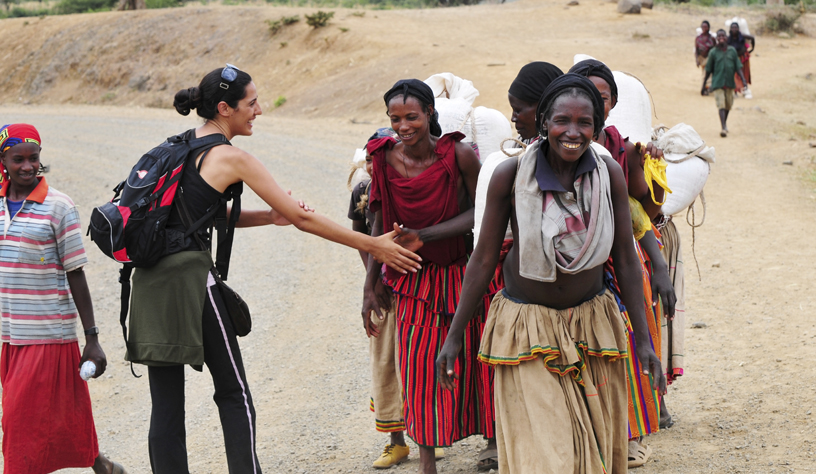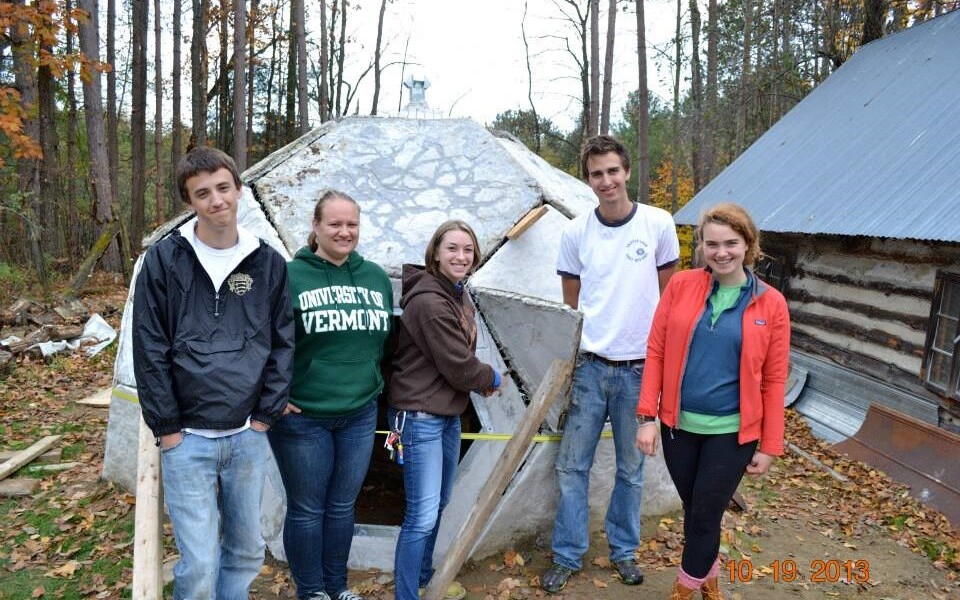In the past two decades, a new kind of travel, voluntourism, has taken learning opportunities to the next level. With this service-based travel, travelers venture abroad to take part in service projects around the world.
As with volunteering locally, engaging in community service requires a certain level of social awareness, which is only intensified when you add different languages, global power dynamics, and cultural norms to the mix. Whether you’re joining the Peace Corps or taking part in a day of service while you travel, developing skills for mindful engagement will help you to make a positive difference in communities you visit abroad.
Kailee Brickner-McDonald, Director of UVM’s Dewey House for Community Engagement, is an experienced traveler and volunteer group leader. She teaches students of UVM’s Dewey House Residential Learning Community about creating positive relationships through service learning projects. Experienced in leading service groups in communities across Vermont and abroad, Brickner-McDonald shares some insights to help travelers make the most of their volunteer service experience.
How to Make the Most of your Voluntourism Service Abroad Experience:
Be Mindful
Without social awareness, voluntourism can be problematic. Some travelers make the mistake of going abroad to “save the world”, and their intentions and interactions can damage community-organization relationships. Rather than setting out on a crusade, Brickner-McDonald advises travelers seek to learn from community members.
She shares that “the most important thing is to remember that there is a huge difference between charity and social justice. If you want to make a difference, you have to let the learning go in both directions, to and from you.”
Be Flexible
Brickner-McDonald speaks from experience. While leading a UVM alternative winter break trip in Honduras, “it became clear that the community partner wasn’t prepared for our group.”

The group was already on the way to the site when the community leaders shared that they didn’t have a project ready for them to do.
Having spent weeks fundraising and researching the project, “it was a shock. We realized it wasn’t going to work because we weren’t going to be useful to the community.”
Bending to the changing dynamics, “we had to adapt our plans. Thanks to a local contact, we were able to relocate. The project was different than we expected but we realized that we could be more helpful elsewhere and we needed to be flexible.”
By listening and adapting to community needs, the group was able to put their skills to work.
Be Self-Aware
Community dynamics can be messy and knowing how you fit into, and create, a social dynamic is important. “Things can be more complex than they seem. There are many perspectives involved and it helps to ask questions and have dialogue.”
“Even in Burlington, there can be power dynamics that separate college students and the community. It takes effort to join together on equal footing.” In order to build working relationships, both sides need to value each other’s knowledge equally.
The same goes for volunteering abroad. “As a participant, it’s important look at different perspectives and respect community members’ insights. While you might be used to using professors’ lectures or text books as places for learning, know that conversations with experienced community members are valuable sources of knowledge.”
Brickner-McDonald adds, “It’s important to consider your role in the situation. You might be entering into a community with very different expectations, goals, and communication styles than your own.”
She recommends asking questions, talking to people, and practicing reflective journaling.
Communicate and Establish Goals
The first step to building a working relationship is making sure you understand the community’s perspective and goals. By talking with community members, try to establish their objectives and see how your perceptions align with the overall project.
“If you’re working in a community where you don’t speak the same language, ask a facilitator to translate for you. Don’t just assume that you’re on the same page about things! You’ll need to work together to understand each other. This is where the most rewarding work can happen.”
Even speaking through a translator, you can still communicate warmth without language. “Don’t be shy to ask for help communicating.”
Make sure there is someone to help facilitate dialogue. “Talking over a meal is a really good way to connect with others. It’s important to find and celebrate your common ground.”
Ask Questions
Travel can bring up challenging ideas and questions. When things feel unsettled or confusing, have a conversation with your peers or faculty member.
Brickner-McDonald says, “You’ll probably have more questions than answers by the end of your trip, but you don’t have to figure it all out on your own.” Any helping relationship is complex, so spend some time working through the discomfort and invite others to join you so you can figure it out together.
Keep Learning
With exposure to new cultures and environments, and self-reflection about your role, volunteering abroad can be an incredible learning opportunity. Your learning doesn’t have to stop when you return from your trip. There are many resources on campus to help you process your experience or dive deeper into service learning.
Brickner-McDonald suggests that you “talk to your faculty to learn more about the specific issues in the area where you’re traveling. They may be able to share ideas about how you can get involved in service when you get back to campus.”
Other great resources on campus include:
- Community University Partnerships & Service Learning (CUPS) Office
- The Department of Student Life: Leadership and Civic Engagement
- The Dewey House for Community Engagement, Residential Learning Community
- The Office of Undergraduate Research
- The Center for Cultural Pluralism
Community Resources:
- The United Way
- VT Council on World Affairs
- Peace and Justice Center
- VT Refugee Resettlement Program
- Seven Days events





